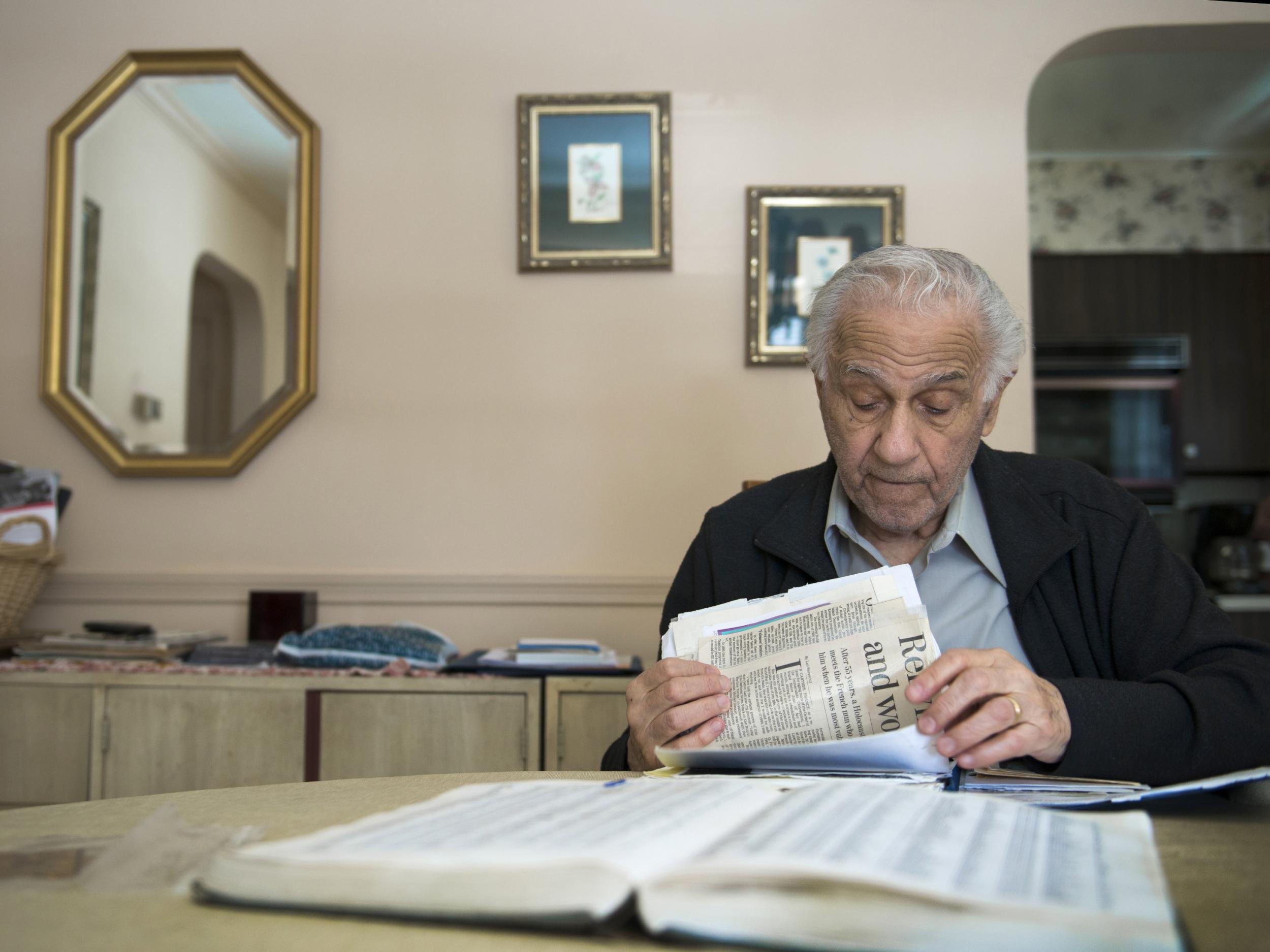Holocaust survivors receive reparations from France for deportations to concentration camps
'Is there any amount of money that could compensate you for even one day in Auschwitz, a factory of death and murder?'

Your support helps us to tell the story
From reproductive rights to climate change to Big Tech, The Independent is on the ground when the story is developing. Whether it's investigating the financials of Elon Musk's pro-Trump PAC or producing our latest documentary, 'The A Word', which shines a light on the American women fighting for reproductive rights, we know how important it is to parse out the facts from the messaging.
At such a critical moment in US history, we need reporters on the ground. Your donation allows us to keep sending journalists to speak to both sides of the story.
The Independent is trusted by Americans across the entire political spectrum. And unlike many other quality news outlets, we choose not to lock Americans out of our reporting and analysis with paywalls. We believe quality journalism should be available to everyone, paid for by those who can afford it.
Your support makes all the difference.More than seven decades after the Second World War ended, 49 Holocaust survivors are receiving $402,000 (£310,000) each from the French government in reparations for the country's trains that deported them to Nazi concentration camps.
Thirty-two surviving spouses of deportees who died following the war will receive up to $100,500 each, officials said.
The payments fall under a 2014 US-France agreement in which the French government offered $60m in reparations for Holocaust deportations.
In exchange, the US government asked courts to dismiss any lawsuits against the French railway, known as SNCF and the French government.
The agreement came after US Holocaust survivors who had been transported to Nazi camps on French trains – usually without no food and a bucket for a toilet – objected when a company affiliated with the French railway began bidding on lucrative US rail contracts. The State Department decided which claims merited payment under the agreement.
“This is a really important moment, a very satisfying moment and the end of a painstaking process to help those who were long denied justice,” said former ambassador Stuart Eizenstat, the State Department's expert adviser on Holocaust-era issues.
Greg Schneider, executive vice president of the Conference on Jewish Material Claims Against Germany, said reparations are “important for the historical record” and to hold governments and companies accountable for their roles in the Holocaust.
“Holocaust compensation is never about the money,” said Mr Schneider, whose nonprofit group negotiates for reparations," he said. “It's about acknowledgment. It's about recognition. It's about justice... Is there any amount of money that could compensate you for even one day in Auschwitz, a factory of death and murder?”
The French Holocaust reparations agreement was unique, Mr Eizenstat said, because it included compensation for the heirs, including children and grandchildren, of both deportees and their spouses.
The heirs were viewed as “standing in the shoes” of those who had died before the agreement was signed, he said. The heirs will receive a portion of a deportee's and spouse's payments, depending on when they died.
The State Department approved 386 of the 867 claims filed, officials said. The agreement covered US citizens, as well as deportees who settled in other countries after the war. It did not cover citizens of France, the United Kingdom, Belgium, Poland and the former Czechoslovakia because those countries have their own reparations programs, Mr Eizenstat said.
Most who are receiving payments are Americans or Israelis, officials said, but they include survivors, spouses and heirs from Canada, Mexico, Peru and other countries.
They also include eight to 10 US and Canadian airmen who were deported after being shot down over France, officials said.
The total payments will end up being almost double what many recipients initially received during the first round in the summer of 2016, when about $30m was paid out.
State Department officials said they had made “conservative” payments as quickly as possible because so many of the survivors and their spouses were elderly. The department is now making a second round of payments to those recipients, as well as to applicants who filed successful claims later.
Letters to the recipients announcing the second round of payments were mailed this week, said Jennifer Newstead, the State Department's legal adviser.
“While no program can provide complete justice for all those who were impacted by deportation from France,” Ms Newstead said, “we hope those affected by one of history's darkest eras will receive some additional relief from these further payments.”
The State Department rejected 481 claims because they didn't fall under the agreement, Mr Eizenstat said. Those included claims filed by French citizens who lived in the United States, Holocaust survivors who had been transported within France but never were deported, and distant relatives who weren't considered heirs.
Lisa Grosh, assistant legal adviser on the agreement, said few were rejected for a lack of documentation. She said State Department officials worked with survivors and families to dig up decades-old marriage licenses, death certificates and deportation records.
“We worked very creatively with the claimants… to give them ideas about how they could go about giving us the certainty we needed to approve the claim,” Ms Grosh said.
The Washington Post
Join our commenting forum
Join thought-provoking conversations, follow other Independent readers and see their replies
Comments